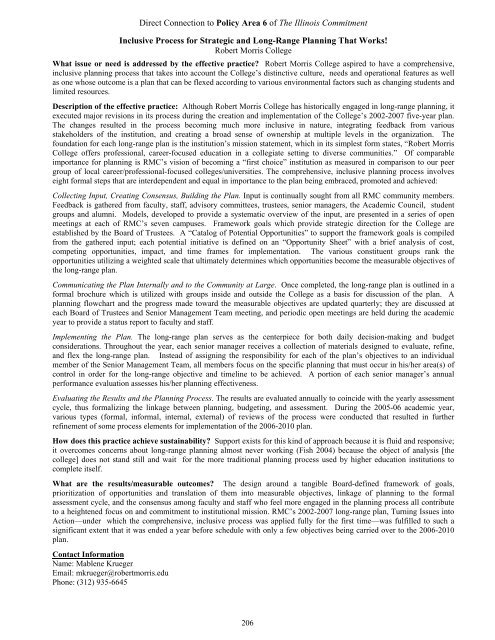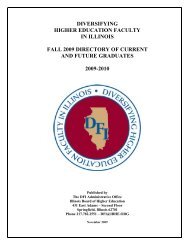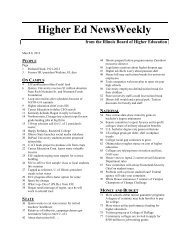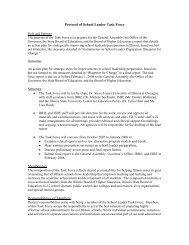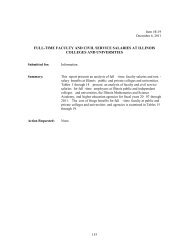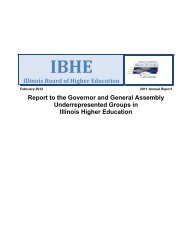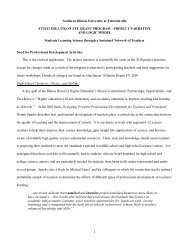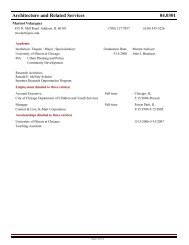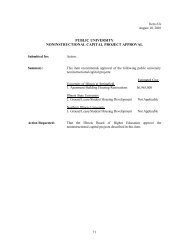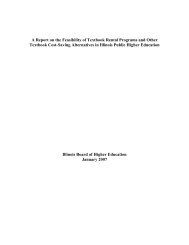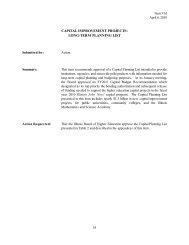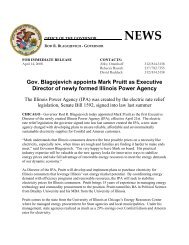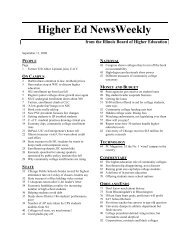Title of Effective Practice: - California Postsecondary Education ...
Title of Effective Practice: - California Postsecondary Education ...
Title of Effective Practice: - California Postsecondary Education ...
Create successful ePaper yourself
Turn your PDF publications into a flip-book with our unique Google optimized e-Paper software.
Direct Connection to Policy Area 6 <strong>of</strong> The Illinois Commitment<br />
Inclusive Process for Strategic and Long-Range Planning That Works!<br />
Robert Morris College<br />
What issue or need is addressed by the effective practice? Robert Morris College aspired to have a comprehensive,<br />
inclusive planning process that takes into account the College’s distinctive culture, needs and operational features as well<br />
as one whose outcome is a plan that can be flexed according to various environmental factors such as changing students and<br />
limited resources.<br />
Description <strong>of</strong> the effective practice: Although Robert Morris College has historically engaged in long-range planning, it<br />
executed major revisions in its process during the creation and implementation <strong>of</strong> the College’s 2002-2007 five-year plan.<br />
The changes resulted in the process becoming much more inclusive in nature, integrating feedback from various<br />
stakeholders <strong>of</strong> the institution, and creating a broad sense <strong>of</strong> ownership at multiple levels in the organization. The<br />
foundation for each long-range plan is the institution’s mission statement, which in its simplest form states, “Robert Morris<br />
College <strong>of</strong>fers pr<strong>of</strong>essional, career-focused education in a collegiate setting to diverse communities.” Of comparable<br />
importance for planning is RMC’s vision <strong>of</strong> becoming a “first choice” institution as measured in comparison to our peer<br />
group <strong>of</strong> local career/pr<strong>of</strong>essional-focused colleges/universities. The comprehensive, inclusive planning process involves<br />
eight formal steps that are interdependent and equal in importance to the plan being embraced, promoted and achieved:<br />
Collecting Input, Creating Consensus, Building the Plan. Input is continually sought from all RMC community members.<br />
Feedback is gathered from faculty, staff, advisory committees, trustees, senior managers, the Academic Council, student<br />
groups and alumni. Models, developed to provide a systematic overview <strong>of</strong> the input, are presented in a series <strong>of</strong> open<br />
meetings at each <strong>of</strong> RMC’s seven campuses. Framework goals which provide strategic direction for the College are<br />
established by the Board <strong>of</strong> Trustees. A “Catalog <strong>of</strong> Potential Opportunities” to support the framework goals is compiled<br />
from the gathered input; each potential initiative is defined on an “Opportunity Sheet” with a brief analysis <strong>of</strong> cost,<br />
competing opportunities, impact, and time frames for implementation. The various constituent groups rank the<br />
opportunities utilizing a weighted scale that ultimately determines which opportunities become the measurable objectives <strong>of</strong><br />
the long-range plan.<br />
Communicating the Plan Internally and to the Community at Large. Once completed, the long-range plan is outlined in a<br />
formal brochure which is utilized with groups inside and outside the College as a basis for discussion <strong>of</strong> the plan. A<br />
planning flowchart and the progress made toward the measurable objectives are updated quarterly; they are discussed at<br />
each Board <strong>of</strong> Trustees and Senior Management Team meeting, and periodic open meetings are held during the academic<br />
year to provide a status report to faculty and staff.<br />
Implementing the Plan. The long-range plan serves as the centerpiece for both daily decision-making and budget<br />
considerations. Throughout the year, each senior manager receives a collection <strong>of</strong> materials designed to evaluate, refine,<br />
and flex the long-range plan. Instead <strong>of</strong> assigning the responsibility for each <strong>of</strong> the plan’s objectives to an individual<br />
member <strong>of</strong> the Senior Management Team, all members focus on the specific planning that must occur in his/her area(s) <strong>of</strong><br />
control in order for the long-range objective and timeline to be achieved. A portion <strong>of</strong> each senior manager’s annual<br />
performance evaluation assesses his/her planning effectiveness.<br />
Evaluating the Results and the Planning Process. The results are evaluated annually to coincide with the yearly assessment<br />
cycle, thus formalizing the linkage between planning, budgeting, and assessment. During the 2005-06 academic year,<br />
various types (formal, informal, internal, external) <strong>of</strong> reviews <strong>of</strong> the process were conducted that resulted in further<br />
refinement <strong>of</strong> some process elements for implementation <strong>of</strong> the 2006-2010 plan.<br />
How does this practice achieve sustainability? Support exists for this kind <strong>of</strong> approach because it is fluid and responsive;<br />
it overcomes concerns about long-range planning almost never working (Fish 2004) because the object <strong>of</strong> analysis [the<br />
college] does not stand still and wait for the more traditional planning process used by higher education institutions to<br />
complete itself.<br />
What are the results/measurable outcomes? The design around a tangible Board-defined framework <strong>of</strong> goals,<br />
prioritization <strong>of</strong> opportunities and translation <strong>of</strong> them into measurable objectives, linkage <strong>of</strong> planning to the formal<br />
assessment cycle, and the consensus among faculty and staff who feel more engaged in the planning process all contribute<br />
to a heightened focus on and commitment to institutional mission. RMC’s 2002-2007 long-range plan, Turning Issues into<br />
Action—under which the comprehensive, inclusive process was applied fully for the first time—was fulfilled to such a<br />
significant extent that it was ended a year before schedule with only a few objectives being carried over to the 2006-2010<br />
plan.<br />
Contact Information<br />
Name: Mablene Krueger<br />
Email: mkrueger@robertmorris.edu<br />
Phone: (312) 935-6645<br />
206


